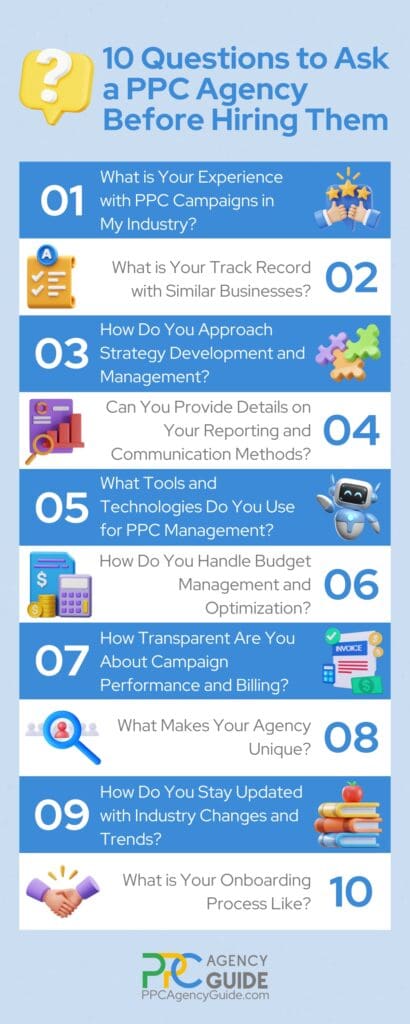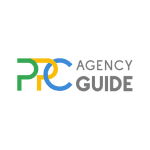
Finding the right PPC agency can feel like searching for a needle in a haystack. After all, it’s not just about finding a firm with expertise. It’s about identifying the right fit for your business and objectives. On this page, we’ll walk you through the best questions to ask a PPC agency before hiring them and teach you how to cut through the jargon to accurately assess their ability to help your business grow.
1. What is Your Experience with PPC Campaigns in My Industry?
When asking a PPC agency about their experience in your industry, you’re trying to gauge whether they understand your field’s unique challenges and opportunities. Let’s take a deeper look at why this question is crucial and what to look for in their response when you ask a PPC agency.
Why it Matters
- Industry Knowledge: Different industries have varying customer behaviors, regulatory environments, and competitive landscapes. An agency experienced in your industry will be more adept at creating targeted campaigns that resonate with your audience. Before reaching out, analyze how well your current campaigns align with industry standards using our PPC Audit Guide.
- Efficiency: The agency’s familiarity with industry-specific keywords, trends, and benchmarks allows it to hit the ground running, optimizing your campaigns faster and more effectively.
- Credibility: An agency with a proven track record in your industry can provide insights and strategies that have already been tested and proven successful.
What to Look For
- Case Studies and Examples: Ask for specific examples of past campaigns they have run in your industry. Look for detailed case studies that showcase the challenges, strategies, and results.
- Metrics and KPIs: Inquire about key performance indicators (KPIs) they focused on in previous campaigns, such as cost-per-click (CPC), conversion rates, return on ad spend (ROAS), and overall campaign return on investment (ROI).
- Client List: A reputable agency will be transparent about the clients they have worked with, provided their clients are comfortable with them sharing the data. If they have long-term clients in your industry, it’s a positive sign.
Real-World Example
For instance, if you own an e-commerce store selling outdoor gear, you’d want to know if the agency has worked with similar businesses. An agency might share a case study about how they helped a small outdoor gear retailer increase online sales by 30 percent through targeted Google Ads campaigns focusing on seasonal trends and popular product categories.
They might also discuss how they navigated challenges such as high competition during peak seasons by using advanced bidding strategies and A/B testing of ad creatives.
Advanced Insights
- Industry-Specific Tools: Ask if they use tools or platforms tailored to your industry. For example, an agency specializing in real estate might use platforms like Zillow or specific CRM integrations to track leads.
- Regulatory Knowledge: For highly regulated industries like healthcare or finance, ensure the agency understands compliance requirements and has experience creating compliant ads.
2. What is Your Track Record with Similar Businesses?
This question helps you understand the agency’s success with businesses like yours. Knowing whether they can deliver results for companies of a similar size, target market, and business model is crucial.
Why it Matters
- Proven Success: A solid track record indicates the agency has developed strategies that work and can replicate success.
- Benchmarking: Understanding their past performance provides benchmarks for what you might expect regarding results and timelines.
- Risk Mitigation: Reduces the risk of investing in a PPC agency that might not deliver on its promises.
What to Look For
- Specific Results: Look for concrete data, such as increases in conversion rates, sales, or lead generation. Ask for metrics like ROAS, cost per acquisition (CPA), and overall ROI.
- Duration of Client Relationships: Long-term relationships with clients like your business indicate consistent performance and client satisfaction.
- Testimonials and Reviews: Positive feedback from clients with similar business models can provide assurance of their capabilities.
Real-World Example
Suppose you own a boutique hotel. An agency might highlight its work with another boutique hotel chain, explaining how it increased direct bookings by 40 percent through targeted PPC campaigns on Google Ads and social media platforms. They might share metrics such as:
- Click-Through Rate (CTR): How they achieved a high CTR by using compelling ad copy and visuals.
- Conversion Rate: The strategies they used to convert clicks into bookings, such as landing page optimization.
- Customer Lifetime Value (CLV): How they focused on high-value customers to maximize long-term revenue.
Advanced Insights
- Scalability: Ask how they adapted their strategies as similar businesses grew. Can their approach scale with your business?
- Niche Market Expertise: If you’re in a niche market, inquire about their success with businesses targeting similar audiences. For example, a PPC agency that has worked with specialty food brands can offer insights into targeting niche customer segments effectively.
- Competitive Landscape Analysis: Understanding how they analyzed competitors for similar businesses can provide insights into their strategic approach.
Metrics to Consider
- Cost Per Click (CPC): Helps understand the efficiency of their ad spend.
- Conversion Rate: Indicates the effectiveness of the ad in driving desired actions.
- Customer Acquisition Cost (CAC): Important for evaluating the cost-effectiveness of their strategies.
Red Flags
- Lack of Transparency: If an agency hesitates to share specific results or client details, it might be a sign of underperformance.
- Inconsistent Results: Variability in success with similar businesses could indicate a lack of a reliable strategy.
3. How Do You Approach Strategy Development and Management?
Understanding how a PPC agency develops and manages its strategies is critical to ensuring its approach aligns with your business goals. This question will help you assess their expertise, methodology, and ability to adapt to your needs.
Why it Matters
- Customization: A tailored strategy is more likely to address your unique challenges and objectives.
- Proactivity: A good agency will manage your campaigns and proactively optimize and adapt them.
- Transparency: Knowing their process provides insight into how they will handle your account and keep you informed.

What to Look For
- Initial Research and Analysis: Ask how they conduct initial research. This includes understanding your business, industry, competitors, and target audience.
- Goal Setting: Look for a clear process for setting and aligning campaign goals with your business objectives.
- Strategy Framework: Inquire about their overall framework or methodology for developing PPC strategies. This could include keyword research, audience targeting, ad copy creation, and landing page optimization.
- Management and Optimization: Understand how they monitor and optimize campaigns over time. This includes A/B testing, bid management, and performance analysis.
Real-World Example
For example, if you run a local fitness studio, an agency might describe their approach as follows:
- Initial Research: They conduct thorough keyword research to identify high-intent search terms related to fitness classes and personal training in your area. They analyze competitors to find gaps and opportunities.
- Goal Setting: They work with you to set specific, measurable goals, such as increasing online class bookings by 20 percent within six months.
- Strategy Framework: They develop a comprehensive PPC strategy that includes:
- Keyword Strategy: Targeting both broad and longtail keywords to capture various stages of the customer journey.
- Ad Copy and Creatives: Crafting compelling ad copy and visuals tailored to different audience segments.
- Landing Page Optimization: Ensuring that landing pages are optimized for conversions, with clear calls to action and relevant content.
- Management and Optimization: They use continuous A/B testing for ad creatives and landing pages, adjust bids based on performance, and analyze data to refine the strategy.
Advanced Insights
- Data-Driven Decisions: Ask about their use of data and analytics. A sophisticated agency will leverage data to make informed decisions and optimizations.
- Automation and AI: Inquire if they use automation tools or AI to enhance their management processes. For example, they might use automated bidding strategies or AI-driven ad optimization.
- Cross-Channel Integration: Explore how they integrate PPC strategies with other marketing channels, such as search engine optimization (SEO), social media, and email marketing, to create a cohesive digital marketing strategy.
- Regular Updates: A good agency will provide regular updates and insights. Ask how often they will communicate performance reports and what metrics they will include.
Key Elements of a Strong Strategy
- Research and Analysis: Comprehensive understanding of your market and competitors.
- Goal Alignment: Clear alignment of campaign goals with business objectives.
- Optimization: Ongoing optimization and proactive adjustments based on performance data.
- Communication: Regular and transparent communication about campaign progress and adjustments.
Red Flags
- One-Size-Fits-All Approach: Beware of agencies that offer cookie-cutter solutions without understanding your unique business needs.
- Lack of Clarity: If an agency cannot clearly explain its strategy development process, it might indicate a lack of depth in its approach.
4. Can You Provide Details on Your Reporting and Communication Methods?
This question helps ensure that you are kept informed about the performance of your PPC campaigns and that the agency’s communication style aligns with your preferences.
Why it Matters
- Transparency: Regular, detailed reports provide transparency and allow you to see how your investment is performing.
- Accountability: Frequent communication ensures the agency is accountable for meeting your campaign goals.
- Informed Decision-Making: Access to detailed data helps you make informed decisions about your marketing strategy.
What to Look For
- Frequency of Reports: Ask how often you will receive performance reports. Common intervals are weekly, bi-weekly, or monthly, depending on the campaign’s complexity and your needs.
- Report Content: Inquire about what metrics and KPIs will be included in the reports. Essential metrics often include CTRs, conversion rates, CPA, ROAS, and overall ROI.
- Customization: Ensure that reports can be customized to focus on metrics that matter most to your business objectives.
- Communication Channels: Clarify the primary communication channels (email, phone calls, video conferences) and the main point of contact.
- Regular Meetings: Discuss the frequency and format of regular meetings to review campaign performance and discuss strategy adjustments.
Real-World Example
For example, if you operate an online clothing store, an agency might provide detailed weekly reports that include:
- Traffic Analysis: Breakdown of the number of visitors driven to your site through PPC campaigns, segmented by ad group and keyword.
- Sales and Conversions: Data on how many of those visitors made a purchase, the average order value, and the overall revenue generated from PPC traffic.
- Budget and Spend: Analysis of how the budget was allocated across different campaigns and insights into the cost-effectiveness of each segment.
- Performance Insights: Recommendations based on the data, such as shifting the budget towards higher-performing keywords or experimenting with new ad formats.
Advanced Insights
- Real-Time Reporting Tools: Ask if they provide access to real-time reporting dashboards. Tools like Google Data Studio or proprietary platforms can offer real-time insights and greater transparency.
- Actionable Insights: Look for reports that go beyond data presentation to provide actionable insights and recommendations.
- Attribution Models: Inquire about the attribution models they use to track conversions. Understanding how they attribute value to different touchpoints can give you a clearer picture of your campaign’s effectiveness.
- Collaboration and Feedback: Ensure there is a process for collaborative discussion and feedback on reports. An open line of communication is essential for making timely adjustments to strategies.
Key Elements of Effective Reporting
- Clarity: Reports should be easy to understand, even if you are not a PPC expert.
- Detail: Comprehensive data that covers all relevant metrics.
- Insights: Actionable recommendations based on the data.
- Customization: Flexibility to focus on the metrics that matter most to your business.
Red Flags
- Generic Reports: Be cautious of agencies that provide generic, one-size-fits-all reports without customization.
- Infrequent Communication: Lack of regular updates or difficulty reaching the agency can indicate poor communication practices.
- Lack of Transparency: Vague or overly complex reports that don’t clearly show performance metrics can indicate issues.
5. What Tools and Technologies Do You Use for PPC Management?
Knowing an agency’s tools and technologies can give you insight into its capabilities, efficiency, and how it stays ahead in the competitive PPC landscape. Advanced tools can significantly enhance campaign performance through better data analysis, automation, and optimization.
Why it Matters
- Efficiency: Advanced tools can automate repetitive tasks, allowing the agency to focus on strategy and optimization.
- Accuracy: High-quality tools improve the accuracy of data analysis, keyword research, and bid management.
- Performance: Cutting-edge technologies can help identify opportunities for improvement and drive better campaign results.
What to Look For
- Keyword Research Tools: Popular keyword research tools like Google Keyword Planner, SEMrush, or Ahrefs help identify high-potential keywords and understand search volume and competition.
- Bid Management and Automation: Platforms like Google Ads automated bidding, Skai, or Marin Software can optimize bids in real-time to maximize ROI.
- Analytics and Reporting: Tools like Google Analytics, Google Looker Studio, and proprietary dashboards offer insights into campaign performance and user behavior.
- Ad Creation Tools: Software like Adobe Creative Cloud, Canva, or specialized ad design tools can streamline the creation of compelling ad creatives.
- Competitor Analysis: Tools like SpyFu or iSpionage provide insights into competitors’ strategies, helping to refine and adjust your campaigns.
Real-World Example
For instance, if you own a travel agency, a PPC agency might use the following tools:
- Google Keyword Planner: To identify popular travel-related keywords and seasonal trends.
- SEMrush: For comprehensive keyword research and competitor analysis, identify which keywords your competitors are bidding on.
- Google Analytics: To track user behavior on your site, measure conversion rates, and understand customer journeys.
- Google Looker Studio: For creating customized, real-time dashboards that provide a clear view of campaign performance.
- Adobe Creative Cloud: To design eye-catching ad creatives that attract clicks and conversions.
Advanced Insights
- AI and Machine Learning: Ask if they use any AI-driven tools for predictive analysis or automated optimization. Platforms like Adext AI or Albert can enhance campaign performance through machine learning.
- Heatmapping Tools: Tools like Hotjar or Crazy Egg can provide insights into how users interact with your landing pages, helping to optimize for better conversions.
- A/B Testing Tools: Software like Optimizely or VWO (Visual Website Optimizer) can facilitate rigorous A/B testing of ad creatives and landing pages.
- Audience Targeting Tools: Facebook Audience Insights or Google Audience Manager can help with precisely targeting the right audience segments for your ads.
Key Tools to Consider
- Google Ads: Essential for running search, display, and video ads.
- Facebook Ads Manager: Important for social media advertising.
- Microsoft Advertising (Formerly Bing): For targeting audiences across the Microsoft ad network and multiple search engines.
- Automated Bidding Tools: Google Ads automated bidding or third-party tools like Skai.
- Analytics Platforms: Google Analytics, Google Looker Studio, and other analytics tools.
Red Flags
- Outdated Tools: Be wary if an agency uses outdated or less effective tools, which could hinder campaign performance.
- Lack of Integration: Ensure the tools they use can integrate with your existing systems for seamless data flow and reporting.
- Inexperience with Tools: An agency should be well-versed in using these tools; lack of experience can lead to suboptimal campaign management.
6. How Do You Handle Budget Management and Optimization?
Understanding how an agency manages and optimizes your budget is crucial for ensuring that your advertising spend is used effectively to maximize ROI. This involves strategic allocation, continuous monitoring, and making data-driven adjustments.
Why it Matters
- Maximizing ROI: Effective budget management ensures that every dollar spent contributes to achieving your marketing goals.
- Efficiency: Proper optimization prevents overspending on underperforming ads and reallocates funds to high-performing ones.
- Scalability: As your business grows, you must know that your PPC campaigns can scale efficiently.

What to Look For
- Budget Allocation Strategy: Ask how they determine the initial budget allocation across different campaigns, keywords, and channels.
- Continuous Monitoring: Understand how frequently they review and adjust the budget based on performance metrics.
- Bid Management: Inquire about their approach to bid management, including the use of manual adjustments and automated bidding strategies.
- Performance Metrics: Look for a focus on KPIs such as CPC, CPA, ROAS, and conversion rates.
- Reallocation of Funds: Ask how they handle reallocating the budget from underperforming to high-performing campaigns.
Real-World Example
For example, if you run a subscription box service, an agency might explain their budget management approach as follows:
- Initial Allocation: Based on initial research and your business goals, they start by allocating a certain percentage of the budget to different marketing channels, such as search ads, display ads, and social media ads.
- Bid Management: Using a combination of automated bidding tools and manual adjustments, they ensure that bids are optimized for the best possible results. For instance, increasing bids on high-converting keywords while reducing bids on less effective ones.
- Regular Reviews: They conduct weekly reviews to analyze performance data, looking at metrics like CPA and ROAS. If a particular campaign is not performing well, they reallocate the budget to more successful campaigns.
- Seasonal Adjustments: During peak seasons, such as holidays, they might increase the budget for campaigns that historically performed well during these times.
Advanced Insights
- Automation Tools: Ask if they use any advanced budget management and optimization tools, such as Google Ads’ automated bidding strategies or third-party platforms like Skai or Marin Software.
- Predictive Analysis: Inquire if they use predictive analytics to forecast future performance and make proactive budget adjustments.
- Granular Control: Look for an agency that offers granular control over budget allocation, allowing for adjustments at the keyword, ad group, and campaign levels.
- ROI Focus: Ensure they have a strong focus on maximizing return on investment. This includes managing ad spend and optimizing for CLV and other long-term metrics.
Key Practices for Effective Budget Management
- Data-Driven Decisions: Using data and analytics to inform budget allocation and optimization.
- Flexible Allocation: Being able to shift budgets based on real-time performance data quickly.
- Regular Reporting: Providing regular updates and reports on budget performance and adjustments.
- Proactive Adjustments: Making proactive changes to bids and budgets based on predictive insights and market trends.
Red Flags
- Lack of Transparency: If an agency cannot clearly explain how it manages and optimizes your budget, it’s a warning sign.
- Infrequent Adjustments: Budget management requires regular monitoring and adjustments; infrequent reviews can lead to inefficiencies.
- Over-Reliance on Automation: While automation is useful, over-reliance without human oversight can lead to missed opportunities and inefficiencies.
7. How Transparent Are You About Campaign Performance and Billing?
Transparency in campaign performance and billing is essential for building trust and ensuring you clearly understand where your money is going and how your campaigns are performing.
Why it Matters
- Trust and Accountability: Transparency builds trust and ensures the agency is accountable for its work.
- Informed Decision-Making: Clear insights into campaign performance help you make informed decisions about future marketing strategies.
- Budget Control: Understanding billing details ensures you know exactly how your budget is spent.
What to Look For
- Detailed Reporting: Ask about the level of detail provided in performance reports. Look for comprehensive data that includes key metrics such as CTRs, conversion rates, CPA, ROAS, and overall ROI.
- Billing Clarity: Inquire about the billing structure and ensure you understand the breakdown of costs, including management fees, ad spend, and additional charges.
- Regular Updates: Ensure the agency provides regular updates on campaign performance, typically through weekly or monthly reports.
- Accessibility: Ask if you will have direct access to ad accounts and analytics platforms. This allows you to verify performance data independently.
- Communication Practices: Understand the communication process for discussing performance reports and billing. Regular meetings or calls to review and discuss the data can be very beneficial.
Real-World Example
Suppose you run a chain of organic food stores. An agency might ensure transparency through:
- Weekly Performance Reports: Providing detailed reports every week that cover vital metrics, such as the number of clicks, conversions, total ad spend, CPA, and ROAS.
- Monthly Billing Statements: Offering clear, itemized billing statements each month that break down costs into categories like ad spend, management fees, and any additional services.
- Direct Access: Giving you direct access to your Google Ads and Google Analytics accounts, allowing you to monitor performance in real time.
- Regular Meetings: Scheduling bi-weekly calls to review performance reports, discuss any changes or concerns, and make strategic adjustments as needed.
Advanced Insights
- Real-Time Dashboards: Ask if they provide access to real-time reporting dashboards through tools like Looker Studio or custom platforms. These dashboards can give you up-to-date insights into campaign performance.
- Transparency in Management Fees: Ensure that the agency clearly explains its management fee structure, whether it’s a percentage of ad spend, a flat fee, or performance-based.
- Contractual Clarity: Review the contract terms carefully. Understand any clauses related to budget adjustments, additional charges, or early termination fees.
- Third-Party Verification: Inquire if they use any third-party tools for auditing and verifying campaign performance to ensure data accuracy.
Key Elements of Transparent Practices
- Comprehensive Reporting: Detailed reports that cover all relevant performance metrics.
- Clear Billing: Itemized billing statements that clearly explain all costs.
- Regular Communication: Scheduled meetings or calls to discuss performance and billing.
- Direct Access: Providing clients with direct access to ad accounts and analytics platforms.
Red Flags
- Vague Reports: Be wary of agencies that provide overly simplistic or vague reports without detailed performance data.
- Hidden Fees: Lack of clarity in billing can indicate hidden fees or unexpected charges.
- Limited Access: If an agency does not give you direct access to ad accounts, it might be a sign that it is not fully transparent.
- Infrequent Updates: Irregular updates on performance and billing can lead to misunderstandings and a lack of trust.
8. What Makes Your Agency Unique?
Understanding what sets a PPC agency apart can help you determine if it is the right fit for your business. This question highlights the agency’s unique strengths, specialized expertise, and differentiators.
Why it Matters
- Competitive Edge: Unique qualities can indicate a competitive edge that could translate into better campaign performance for your business.
- Specialized Expertise: Unique features often stem from specialized skills or experience that can be particularly beneficial for your industry or specific needs.
- Innovation and Adaptability: Agencies with unique approaches are often more innovative and adaptable, staying ahead of industry trends.
What to Look For
- Specialization: Does the agency specialize in certain industries or types of campaigns? Specialized knowledge can lead to more effective strategies.
- Proprietary Tools: Ask about any proprietary tools or technologies they use that might give them an edge in campaign management and optimization.
- Case Studies and Success Stories: Look for unique success stories or case studies demonstrating how their distinct approach has benefited other clients.
- Innovative Strategies: Inquire about any innovative strategies or methodologies they use that differ from standard PPC practices.
- Client Support and Communication: Exceptional client support and communication practices can be a significant differentiator.
Real-World Example
For example, if you are in the healthcare industry, an agency might highlight its specialization in healthcare PPC campaigns:
- Industry Expertise: They have a dedicated team with extensive experience in healthcare advertising, understanding the industry’s regulatory requirements and unique challenges.
- Proprietary Tools: They use a proprietary analytics platform that integrates with healthcare CRM systems, providing deeper insights into patient acquisition and retention.
- Innovative Strategies: They might use advanced audience targeting techniques to reach specific patient demographics and leverage machine learning to optimize ad spend in real-time.
- Success Stories: They share a case study where they helped a healthcare provider increase patient inquiries by 50 percent while reducing the cost per acquisition by 30 percent.
Advanced Insights
- Cultural Fit: Consider the agency’s culture and values. An agency that aligns well with your company culture can lead to a more productive and enjoyable working relationship.
- Thought Leadership: Look for agencies that contribute to industry knowledge through blogs, whitepapers, webinars, and speaking engagements. Thought leaders often stay ahead of trends and can bring innovative ideas to your campaigns.
- Custom Solutions: Ask if they offer custom solutions tailored to your business needs rather than a one-size-fits-all approach. Personalized strategies can lead to more effective campaigns.
- Client Retention Rate: A high client retention rate often indicates satisfied clients and successful long-term relationships.
Key Differentiators to Consider
- Specialized Industry Experience: Deep knowledge in your specific industry.
- Proprietary Technologies: Unique tools and technologies that enhance campaign performance.
- Innovative Strategies: Creative and effective strategies that go beyond standard practices.
- Exceptional Client Support: High level of support and communication tailored to your needs.
- Proven Success: Strong track record of delivering results for similar businesses.
Red Flags
- Lack of Specifics: Be cautious if an agency cannot clearly articulate what makes them unique or if their claims are too generic.
- Overpromising: Unrealistic promises or guarantees of success can be a red flag. Look for agencies that provide realistic expectations and evidence-backed claims.
- One-Size-Fits-All Approach: Avoid agencies that offer cookie-cutter solutions without considering your unique business needs.
9. How Do You Stay Updated with Industry Changes and Trends?
Staying current with industry changes and trends is essential for any PPC agency to use the latest strategies and tools to optimize its campaigns. This question helps you gauge the agency’s commitment to continuous learning and adaptation.
Why it Matters
- Adaptability: The digital marketing landscape is constantly evolving. An agency that stays updated can quickly adapt to changes and leverage new opportunities.
- Competitiveness: Being aware of the latest trends and best practices ensures your campaigns remain competitive and effective.
- Compliance: Staying informed about changes is particularly important for industries with strict regulations. It helps maintain compliance and avoid penalties.

What to Look For
- Continuous Education: Ask how they ensure their team stays educated on the latest trends. This might include attending industry conferences, webinars, and training sessions.
- Industry Publications and Blogs: Inquire about the sources they follow for industry news and updates, such as Search Engine Land and Google Ads blogs.
- Certifications and Partnerships: Look for certifications from recognized organizations, such as Google Ads certifications or partnerships with key platforms like Google, Facebook, and Microsoft.
- Internal Knowledge Sharing: Understand how they share new knowledge and strategies internally. Do they have regular training sessions or team meetings to discuss recent developments?
- Thought Leadership: Agencies that contribute to industry thought leadership through publishing articles, speaking at events, or hosting webinars are often more proactive about staying updated.
Real-World Example
Suppose you run a B2B software company. An agency might describe its approach as follows:
- Industry Conferences: They regularly attend major conferences like SMX (Search Marketing Expo) and Pubcon to learn about the latest developments in PPC and digital marketing.
- Certifications: Their team holds Google Ads and Microsoft Advertising certifications, ensuring they are up-to-date with platform-specific changes and best practices.
- Subscriptions: They subscribe to leading industry publications such as Search Engine Journal and Marketing Land to stay informed about emerging trends and algorithm updates.
- Webinars and Online Courses: Team members regularly participate in webinars and online courses offered by platforms like HubSpot Academy and LinkedIn Learning.
- Internal Training: They conduct monthly internal training sessions to share new insights and strategies with the entire team.
Advanced Insights
- Beta Programs: Ask if they participate in beta programs offered by ad platforms. This can provide early access to new features and tools.
- Data-Driven Insights: Inquire how they use data from their own campaigns to identify trends and inform strategy adjustments.
- Community Involvement: Look for involvement in professional communities and forums, where they can engage with other professionals and exchange insights.
- Client-Specific Adaptation: Ask how they tailor their approach to stay updated on trends specific to your industry, ensuring that their strategies remain relevant to your market.
Key Practices for Staying Updated
- Regular Training and Education: Ongoing education through courses, certifications, and training sessions.
- Industry Engagement: Active participation in industry events, webinars, and professional communities.
- Thought Leadership: Publishing and contributing to industry knowledge through articles, blogs, and speaking engagements.
- Internal Knowledge Sharing: Regular meetings and training sessions to disseminate new information within the team.
Red Flags
- Lack of Continuous Learning: Be wary of agencies that do not emphasize ongoing education and training for their team.
- Outdated Practices: An agency that relies solely on outdated strategies and tools may not be able to deliver optimal results in a rapidly changing landscape.
- No Industry Engagement: Lack of involvement in industry events or communities can indicate a lack of commitment to staying current with trends and changes.
10. What is Your Onboarding Process Like?
Understanding the onboarding process of a PPC agency is crucial for setting expectations and ensuring a smooth transition into the partnership. The onboarding process sets the foundation for the agency’s understanding of your business, goals, and how they will manage your campaigns.
Why it Matters
- Smooth Transition: A well-defined onboarding process ensures a smooth transition and helps avoid misunderstandings.
- Alignment: It ensures that the agency’s goals are aligned with your business objectives from the start.
- Efficiency: A structured onboarding process can expedite the setup and optimization of your campaigns.
What to Look For
- Initial Discovery: Ask about the initial discovery phase. This should involve understanding your business, industry, target audience, and specific goals.
- Data and Access: Inquire about the data and access requirements. This includes providing access to your ad accounts, analytics platforms, and any existing campaign data.
- Kickoff Meeting: Ensure there is a kickoff meeting to discuss strategy, timelines, and expectations. This meeting should include key stakeholders from both your team and the agency.
- Timeline and Milestones: Ask for a clear timeline and milestones for the onboarding process. This includes when to expect initial campaign setups, first reports, and optimization reviews.
- Communication Plan: Understand the communication plan during the onboarding phase. How often will you receive updates, and who will be your main point of contact?
Real-World Example
For instance, if you own an online jewelry store, an agency might describe its onboarding process as follows:
- Initial Discovery: They start with an in-depth discovery session to understand your business, target audience, unique selling propositions, and specific goals, such as increasing online sales or improving ROAS.
- Data Collection and Access: They gather necessary data and gain access to your existing Google Ads, Facebook Ads, and Google Analytics accounts. They also review any historical campaign performance data.
- Kickoff Meeting: A kickoff meeting with key stakeholders is scheduled to discuss the findings from the discovery phase, outline the strategy, and set clear expectations and timelines.
- Strategy Development: They develop a detailed PPC strategy tailored to your business goals, including keyword research, audience targeting, ad copy creation, and landing page optimization.
- Timeline and Milestones: They provide a timeline with key milestones, such as the initial campaign setup within the first two weeks, the first performance report at the end of the first month, and regular optimization reviews.
- Regular Updates: During the onboarding phase, weekly updates are provided to keep you informed about progress and any needed adjustments.
Advanced Insights
- Custom Onboarding Plan: Ask if they offer a custom onboarding plan tailored to your specific needs and goals.
- Training and Support: Inquire if they provide any training or support for your team to understand the basics of PPC and the tools they will be using.
- Documentation and Resources: Look for agencies that provide detailed documentation and resources, such as onboarding guides, best practice documents, and access to a knowledge base.
- Integration with Other Channels: If you are running campaigns across multiple channels, ensure the onboarding process includes integration and alignment with your broader marketing strategy.
Key Elements of a Strong Onboarding Process
- Detailed Discovery Phase: Comprehensive understanding of your business and goals.
- Clear Communication: Regular updates and clear communication channels.
- Defined Timeline and Milestones: Specific timelines and milestones to manage expectations.
- Strategy Development: A well-thought-out PPC strategy tailored to your needs.
- Data and Access Management: Efficient handling of data and account access.
Red Flags
- Lack of Structure: An undefined or vague onboarding process can lead to confusion and misalignment.
- Poor Communication: Infrequent updates or unclear communication during onboarding can indicate potential issues down the line.
- Over-Promising: Unrealistic promises during the onboarding phase can be a red flag. Look for realistic and evidence-backed commitments.
Streamline Your Search
Knowing which questions to ask a PPC agency can help you ensure you not only find a qualified team but also one that’s the right fit for your business. However, the vetting process can still be time-consuming and complicated, especially if you don’t have personal experience managing PPC campaigns. That’s where PPC Agency Guide comes in. We can help streamline your search by matching you with an experienced firm that understands your business and can help you reach your goals.
To get started, request a complimentary consultation.

FAQs About Questions to Ask a PPC Agency
How can I determine if a PPC agency has experience in my industry?
Request case studies, client testimonials, and specific examples of past campaigns in your industry. Look for evidence of understanding your industry’s unique challenges and opportunities.
What key metrics should a PPC agency report on?
Essential metrics include CTRs, conversion rates, CPA, return on ad spend ROAS, and overall campaign ROI.
What tools do PPC agencies use to manage campaigns?
Common tools include Google Ads, SEMrush, Google Analytics, bid management tools like Skai, and reporting platforms like Google Looker Studio.
How do PPC agencies handle budget management and optimization?
Agencies typically use a combination of automated bidding tools and manual adjustments, continuously monitoring and reallocating budget based on performance metrics to maximize ROI.
What makes a PPC agency unique?
Unique qualities may include specialized industry expertise, proprietary tools, innovative strategies, exceptional client support, and a strong track record of success.
Why is transparency important in PPC campaign management?
Transparency builds trust and ensures accountability, providing clear insights into campaign performance and how your budget is being spent.
How do PPC agencies stay updated with industry changes?
Agencies stay updated through continuous education, attending industry conferences, earning certifications, following leading publications, and engaging in professional communities.
What should I expect during the onboarding process with a PPC agency?
Expect an initial discovery phase, data and access setup, a kickoff meeting, strategy development, and a clear timeline with milestones and regular updates.
What are the benefits of using a specialized PPC agency for my business?
Specialized PPC agencies offer deep industry knowledge, tailored strategies, and proven success in your market, leading to more effective and efficient campaign management.
Can PPC Agency Guide help me find an agency in the US?
Whether you need a PPC firm in Austin, are exploring PPC agencies in Orlando, or anywhere in between, we've got you covered. We're familiar with the work of PPC agencies across the U.S., Canada, and the U.K.. Location is a consideration in our matching process, though we also consider each agency's experience and track record with businesses like yours to ensure the best possible fit.


















